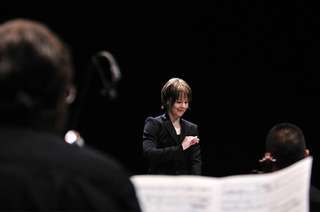|
Back
A Trio of Finns de Siècle New York
Rose Theatre, Lincoln Centre
08/14/2008 -
“Mostly Mozart Festival”
Kaija Saariaho: Notes On Light (New York premiere)
Ludwig van Beethoven: Symphony No. 3 in E-flat major (“Eroica”)
Anssi Karttunen (cello)
City of Birmingham Symphony Orchestra, Susanna Mälkki (conductor) 
S. Mälkki (© Aymeric Warmé-Janville)
Since composer Kaija Saarahio gave express visual titles to the five movements of her Notes On Light, I felt no hesitation in letting my mind wander during the 30-minute work last night. But no, this de facto cello symphony did not prompt my mind wondering about Thai curry or South Ossetian politics or Chinese pollution. Rather, her abbreviated orchestra generated dreams swirling around her own swirling sounds and the fantasia-like harmonies of her cellist, Anssi Karttunen.
The titles were geared to each movement, but Ms. Saariaho offered several unities to the whole work. Since the only brass were horns, the sounds were never blaring or tumultuous. At the same time, the orchestra played as a whole, with nary a solo instrument. The textures were endlessly rolling about, sometimes coming down the scale with each instrument somersaulting after the other one. Sometimes, they wheezed in and out like a series of accordions. Sometimes, small groups formed translucent colors which played around the cello like masses of different butterflies.
I couldn’t pick a theme per se, but yes, from the first notes onward, two “cells” made their point, both on a minor second interval. The first two notes go from F-sharp down to F. And all kinds of permutations make their way through the work. The second rises from C sharp to D, also with its variations.
As a whole, Ms. Saariaho produced a piece which could churn and spin so quickly that as a listener I felt like the eye of the storm, looking out at this universe of lights and sounds and harmonics, like an astronomer finding a way through the night sky.
On the other hand, while the composer hardly offers an homage to her predecessors, one felt certain influences. Takemitsu, for one, another composer for whom natural phenomena are given a musical push. Ligeti’s Cello Concerto has the same quantum use of the soloist, but otherwise is far more enigmatic.
I feel guilty mentioning Richard Strauss, but yes, with titles like On Fire Eclipse, Heart of Light (is that title from T.S. Eliot’s The Waste Land?) makes one listen for just those sounds. In Strauss’s day, a wind-machine would have accomplished the same musical mission. Ms. Saariaho is far more subtle.
For another—and I doubt if the composer ever heard him—was the orchestral music of Mantovani. He let his mawkish, sentimental sickly-sweet strings pile onto each other the same way. But that would only be my perverse opinion.
The sun around which these infinite planets revolved was of course the cello, which rarely stopped playing during the whole 28 minutes. Anssi Karttunen, for whom the work was composed, was that most unusual cellist who could use apparently every cello trick in the book, but performed with such sureness and passion that one had to think later about the fluctuations or harmonics or strong pizzicatos.
Yes, this work so belongs to him, so that he seems to be its sole performer, even recording it with Christoph von Dohnanyi. Ms. Saariaho could not possibly have had a better collaborator.
The evening had a third countryman at the helm, the fine conductor, Susanna Mälkki. (Along with Eka-Pekka Salonen and numerous others, the 21st Century could well turn out to be the Finn de Siècle).
Garbed in the dooming black of a Grand Inquisitor or a hell-and-brimstone preacher, she led the City of Birmingham Orchestra through Notes On Light with dictatorial strokes, quite necessary with the pinpoint entrances for the textures. After the intermission, though, Beethoven’s Eroica didn’t need her now habitual severity. She galloped the orchestra along at a hair-trigger pace, but allowed little breathing room. The result was a well-performed but strangely unmoving performance.
Either that, or we were still in the half-dreamy state produced by Kaija Saariaho’s mesmerizing Notes on Light.
Harry Rolnick
|